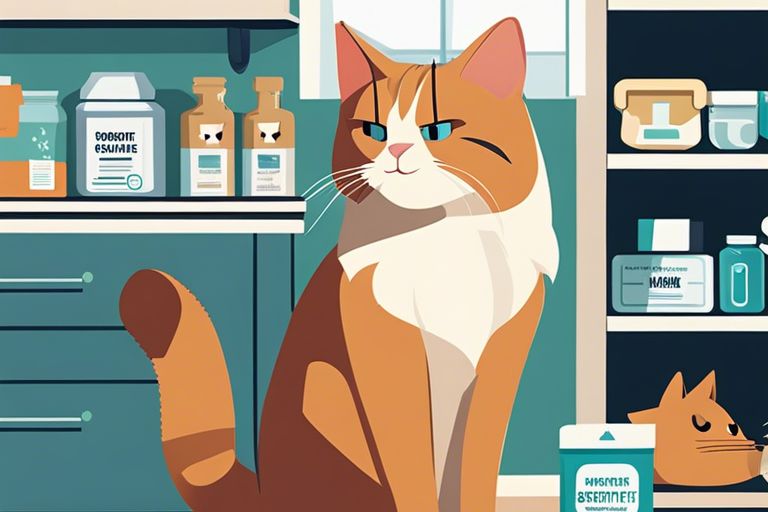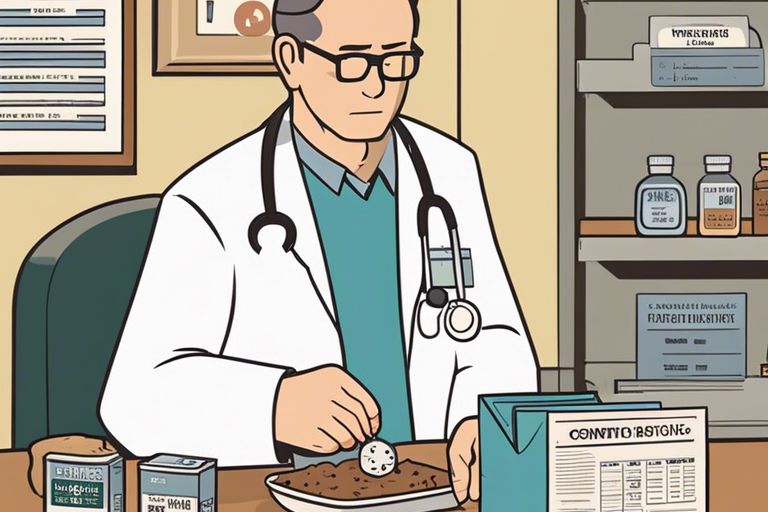Do you find that your cat often experiences gastrointestinal upset, such as vomiting, diarrhea, or flatulence? If so, your cat may have a sensitive stomach. This can be a common issue for many felines, and it is important to address it promptly to ensure your cat’s health and well-being. Ignoring these symptoms can lead to dehydration, malnutrition, or even chronic health problems. However, with the right approach, you can manage your cat’s sensitive stomach and help them lead a healthy, comfortable life.
Key Takeaways:
- Variability in Cats: It is normal for cats to have differing levels of sensitivity in their stomachs.
- Dietary Sensitivities: Some cats may have sensitivities to certain ingredients in their food, leading to stomach issues.
- Underlying Health Conditions: Sensitive stomachs can also be a symptom of an underlying health issue, so it’s important to consult with a veterinarian if your cat is experiencing digestive issues.
- Gradual Transition: When changing your cat’s food, it’s important to do so gradually to minimize the risk of digestive upset.
- Quality of Food: Feed your cat a high-quality, easily digestible diet to help support their sensitive stomach.
Understanding Feline Digestive Systems
Any cat owner knows that sensitive stomachs are not uncommon in our feline friends. Although it can be frustrating to see your cat dealing with digestive issues, it is important to understand the underlying causes. A cat’s digestive system is unique and requires specific care to keep it functioning properly. By gaining a better understanding of feline digestive systems, you can help your cat maintain a healthy stomach and overall well-being.
Anatomy of a Cat’s Stomach
When it comes to understanding your cat’s sensitive stomach, it’s essential to have a basic knowledge of their digestive anatomy. Cats have a relatively small stomach compared to their body size, which means they cannot handle large meals or sudden dietary changes. The stomach is divided into several sections, including the fundus, body, antrum, and pylorus, each playing a role in the digestion process. The lining of a cat’s stomach is delicate and susceptible to irritation, leading to sensitivity and potential digestive issues.
Common Digestive Processes in Cats
Understanding the common digestive processes in cats is crucial in addressing sensitivity issues. Cats are obligate carnivores, meaning their digestive systems are designed to primarily process animal protein. Your cat’s stomach secretes digestive enzymes and gastric acid to break down food efficiently. While this design is beneficial for digesting meat, it also means that other foods and ingredients can be challenging for your cat to tolerate. Why Your Cat Has a Sensitive Stomach [According to The Honest Kitchen] explains further reasons behind feline sensitive stomachs.
Signs of a Sensitive Stomach in Cats
Now, let’s take a closer look at the signs that may indicate your cat has a sensitive stomach. It’s important to pay attention to these symptoms so that you can take the necessary steps to help your feline friend feel better.
Symptoms to Watch For
If you notice that your cat is experiencing vomiting, diarrhea, constipation, or excessive gas, these could be signs of a sensitive stomach. Additionally, if your cat has a decreased appetite, is refusing to eat, or is exhibiting signs of discomfort, such as abdominal pain or bloating, it may be an indication that their stomach is sensitive to certain foods or environmental factors. It’s important to monitor your cat’s behavior and bodily functions to determine if they are experiencing any of these symptoms.
When to Consult a Veterinarian
If you notice any of the symptoms mentioned earlier, it is important to consult a veterinarian as soon as possible. Chronic vomiting and diarrhea can lead to dehydration and nutrient deficiencies, so it is crucial to address these issues promptly. Your veterinarian will be able to properly diagnose the cause of your cat’s sensitive stomach and provide you with a treatment plan tailored to your cat’s specific needs. Don’t hesitate to seek professional help if you see any concerning signs in your cat.
Managing a Cat’s Sensitive Stomach
Your cat’s sensitive stomach can be managed with a few changes in their diet and lifestyle. By making the necessary modifications and seeking appropriate treatments, you can help alleviate their discomfort and improve their overall well-being.
Dietary Modifications and Recommendations
If your cat has a sensitive stomach, it’s crucial to pay attention to their diet. Look for high-quality cat food that is easily digestible and contains limited ingredients. Eliminate any potential allergens such as grains, artificial additives, and fillers. Consider feeding your cat smaller, more frequent meals to prevent overeating and reduce the likelihood of digestive issues. Additionally, adding probiotics to their diet can help promote a healthy gut and aid in digestion. Be sure to consult with your veterinarian before making any significant changes to your cat’s diet.
Treatments and Remedies
There are various treatments and remedies that can help alleviate your cat’s sensitive stomach. Your veterinarian may recommend medications to address any underlying medical conditions or symptoms such as vomiting or diarrhea. It’s important to follow their guidance and administer any prescribed medications as directed. Additionally, supplements such as digestive enzymes or omega-3 fatty acids may be beneficial for your cat’s digestive health. Natural remedies such as herbal supplements or essential oils should only be used under the supervision of a professional to ensure safety and efficacy.
Preventative Measures and Best Practices
Unlike humans, cats can be quite secretive about their discomfort or pain. This makes it important to take preventive measures and follow best practices to ensure that your cat’s sensitive stomach is managed effectively. By making a few changes in their environment and regular check-ups, you can help keep your feline friend healthy and happy.
Importance of Regular Check-Ups
Regular check-ups with your veterinarian are crucial for keeping your cat’s stomach sensitivities in check. Your vet can perform a thorough examination and recommend any necessary dietary changes or medications. They can also check for any underlying medical conditions that may be contributing to your cat’s sensitive stomach. Early detection of any issues can prevent more serious health problems down the line.
Creating a Stress-Free Environment
Stress can have a significant impact on your cat’s digestive system. It’s important to create a calm and relaxing environment for your cat to help alleviate any stress they may be experiencing. This could include providing a quiet space for your cat to retreat to, ensuring they have access to their litter box at all times, and minimizing sudden changes in their routine. By keeping your cat comfortable and stress-free, you can help maintain a healthy digestive system.

Is it normal for my cat to have a sensitive stomach?
Following this discussion, you now have a better understanding of the factors that contribute to a cat having a sensitive stomach. While it is relatively common for cats to experience stomach issues, it is important to pay attention to any ongoing symptoms and consult with your veterinarian to ensure that your feline friend receives the appropriate care and treatment. With a proper diet, regular veterinary check-ups, and potential dietary adjustments, you can help manage and improve your cat’s sensitive stomach and overall well-being.
FAQ
Q: Is it normal for my cat to have a sensitive stomach?
A: Yes, it is not uncommon for cats to have sensitive stomachs. Many factors, such as diet changes, food allergies, and underlying health conditions, can contribute to a cat having a sensitive stomach.
Q: How can I tell if my cat has a sensitive stomach?
A: Some common signs of a sensitive stomach in cats include vomiting, diarrhea, constipation, and excessive gas. Cats may also exhibit loss of appetite or disinterest in food if they are experiencing stomach sensitivities.
Q: What can I do to help my cat with a sensitive stomach?
A: If you suspect that your cat has a sensitive stomach, it is important to consult with a veterinarian to rule out any underlying health issues. Once a diagnosis is made, your vet may recommend a specialized diet, probiotics, or other dietary supplements to help manage your cat’s sensitive stomach. It is important to follow your vet’s recommendations closely and monitor your cat’s response to the prescribed treatment plan.

Jayley, a devoted cat enthusiast, also writer for other cat blog as well. She aims to dedicated to providing comprehensive information, insights, and advice on everything you’d ever want to know about our whiskered companions.
